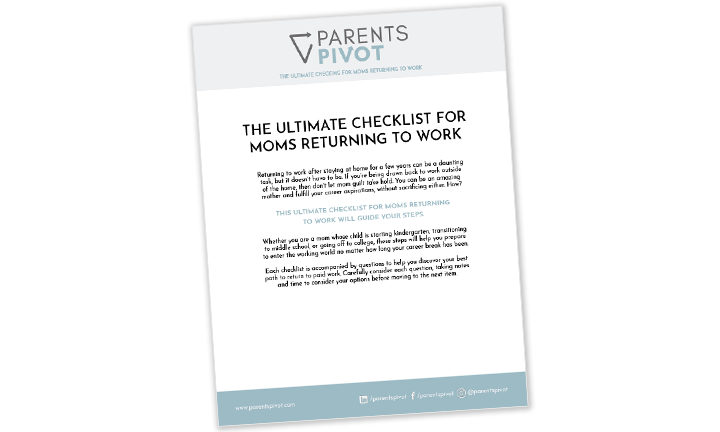Welcome back to Part 2 of my interview with Brenda James, former Managing Director at Clayton Services. Last week she shared some of the transferrable skills that her star return-to-work hire brought from her experience as a stay at home mom to her experience as a recruiter. If you missed that, then you can check it out here. Sign up for our newsletter to make sure that you don’t miss the next one of these articles. There is so much more to cover!! The interviews have been edited for brevity.
Part 1: We learned about Debbie, Brenda’s star return-to-work hire, and what transferrable skills she brought from her experience as a stay at home mom to her experience as a recruiter. If you missed that, then you can check it out here.
Part 2: In this article, I will share some of the challenges that Debbie experienced returning to work and how she and Brenda worked through them.
Part 3: Next week, I will share some of the benefits that Brenda experienced in hiring a stay at home mom.
Part 4: For the final post, we will discuss how employers can start to think about on-boarding return to work candidates.
Let’s get started!
Anna: Debbie sounds amazing! Were there any concerns that you had around hiring her?
Brenda: One of the things that was a concern for me when she started were her computer skills. At first, they were a little lacking and she was aware of this. She did some work on her own and at work to get up to speed with those skills. Of all the skills that we wanted to see in a recruiter, computer skills were the most teachable. So, this is what I tell my employer clients to keep in mind when hiring. What's trainable? What are those intangible skills that are harder to develop? If it’s trainable, then you can easily work with that.
Anna: What do you think are some important things for stay at home parents to consider when returning to work?
Brenda: Debbie worked through several things before returning to work with us.
1) Have a Back Up Plan for childcare: One thing that Debbie and I spoke about was what to do if something happened and she couldn’t be at work. Of course, that could happen to anyone: when you have a flat tire, or doctor’s appointment, whatever. Because we were a small company and this was before everything was on the cloud. If someone wasn't there, then it was hard to get work done. Now, people can work at home but back then, we didn't have that ability. We talked about this upfront. Debbie definitely had backup plans in place so that we were prepared.
2) Shift your mindset & communicate expectations: Debbie also worked through her thoughts around being ok with not being as involved with the children, setting up expectations, and establishing boundaries with them. She communicated with them about her job, what that was going to look like, and what the backup plans were going to be. Debbie realized “Not only is this a change for me. It's a change for my kids.” And they understood. She communicated what she needed from them and held them accountable for the changes that needed to be made. She also thought through her new routines and schedules.
3) Get up to date on industry trends, professional educational requirements and corporate culture: Today stay at home moms and dads and people returning have got active lives. They stay in touch with their coworkers and they keep up their continuing education. So, just that interacting is good. Remembering some of the personalities that you're going to encounter back on the job and looking at your assumptions and how you're viewing that as you're learning to navigate not only the job itself, the skill set, your boss and your coworkers, but the corporate culture too. Some of the political things that might happen within the company. There's, a return to that type of thinking that you want to be prepared for.
Anna: Do you have any ideas about how they can prepare for that?
Brenda: You know, I think this is a self-awareness. You have to realize how to manage being the new person coming in. Also, getting back into that kind of professional environment and mindset and understanding what that looks like today versus, like with Debbie, 15 years ago. And fortunately for me she was eager to step into that professional environment. She was phenomenal.
Everyone has a different learning style. Identifying what works for you when faced with a new situation. For me, this is reading. I look for books that are going to tell me what I need to know. I research what I need to know and I am very self-aware. I'll ask those questions of myself: What am I going to expect? What is this going to look like? It could be helpful to talk this through with a friend or coach.
Ask questions when you are interviewing around what a day in your life looks like at that company. I like to meet with my supervisor and peer set in person. Often times now we're interviewing via Skype so this can be a challenge. If you get to that point, then being able to come to the physical office and see that and understand the atmosphere. Do a little research. Get your mindset right. Whether it's a coach or a mentor or reading or whatever that looks like for you.
Actually, I hired lots of people re-entering the workforce. And I usually had people be very successful but I was open to that. So finding those companies that are the right fit. Just because you need a job doesn't mean that the company is as open to a return to work candidate. It's not really fair. It's not really realistic on the employer’s part because even if you hire someone who's had no gap in their employment, then it doesn't necessarily mean that they're going to be successful in that company either. So, understanding what's important to you and looking at that companies that have that mindset. If the company is very strict or micromanaging or just not open to allowing someone to get their feet wet and get started, then maybe that isn't the company for you. It's okay. It's like kissing a lot of frogs before you get to the prince but you've got to know what you want to take away from the experience and just as with anything, learn from that. It’s important to know what you're looking for in a company, what their on-boarding process is.
Anna: Yes, like whether they've hired return to work candidates. Whether they have working mothers and fathers in their group and if they have family friendly work policies. I love that! I think you also started to touch on figuring out the corporation’s values and what they say are important traits to see in their employees. It's something that I discuss with my clients too. Trying to help them figure out what their own values are and how that might line up with a company's values.
Brenda: Yes and there is lots of research that you can do: Glassdoor, or you can look at reviews for the company, you can talk to employees, go to their LinkedIn, go to their Facebook page. Get your network going. There is probably someone in your network who may know something about this company. Ask your friends. A lot of it comes down to networking. Find a couple of networking groups, get involved and ask questions. Learn from their experiences. You don't have to reinvent the wheel. There's so much going on out there in the world. And so much of a shift to this way of thinking that, and you can find a lot of your answers and good advice and good insight. It takes a little work on your part, you've got to get out there, but you can do it.
Chambers of commerce often have different meet ups. The Greater Houston Women's Chamber is going through and taking a look at companies that are great places for women to work. That’s a great place to start. There are companies out there where the dialogue around flex work is starting. Check out networking groups in your industry. If for some reason you didn't stay connected to your network, then reconnect now. Go through your industry, get your skill set up to date. Look at what you need. Is there a certification that you need? Is there a class that you need to brush up on some basic computer skills?
All of that information is available. Look at job descriptions and look to see what companies are looking for. Take a look at where you might be weak or what you are missing then go ahead and start adding skills that you need. It takes a little work but it's a part of that process of getting the brain, back focused on your career.
Anna: Yes! All of this is part of the work that we do in the THRIVE like a mother group coaching and workshop series at Parents Pivot. And you get the bonus of being surrounded by a supportive community of parents who are going through the same things that you are!
Thank-you Brenda for being honest about some of the challenges that she and Debbie faced and some of the things that stay at home moms and dads can do to explore a return to paid work. What are some of the experiences that you have had as a stay at home mom or dad returning to work? Send us an e-mail or add in the comments below. We would love to hear from you!
We have so much more to share! Stay tuned for part 3 where we will discuss some of the benefits that Brenda experienced in hiring return to work candidates and part 4 where we will discuss how employers can start to think about on-boarding return to work candidates. If you missed part 1 where we talked about the transferrable skills from parenting to paid work, then you can check it out here.
To stay in the loop with great articles, events, and workshops to help parents return to their careers with strength and clarity, join our Parents Pivot newsletter here.
Wishing you all the best!
Anna
Parents Pivot works with parents returning to work to help them reconnect to their careers with strength and clarity. We offer coaching and support throughout the job search process whether it is figuring out what you want to do when you return to work, helping you with your resume and interviews, and coaching you through the on boarding process in your new career. Reach out to learn more about how we can serve you.









